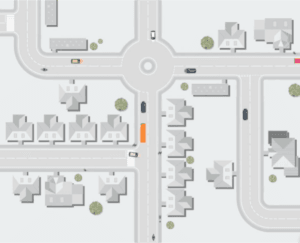The Law Commission of England and Wales is calling for the remote driving of vehicles from abroad to be banned in the UK.
While the technology exists in places like farms, and warehouses, it could also be introduced to vehicles used on the roads, such as delivery vans and rental cars.
Therefore the Commission has asked the Government to provide clarity on how to regulate the technology of vehicles being controlled from remote locations.
It says remote driving raises significant safety challenges around reliable connectivity, how drivers maintain situational awareness and remain alert, and what cybersecurity measures are needed to minimise the risk of unauthorised takeover.
Its key conclusions are:
- A new statutory licensing scheme for companies deploying remote drivers beyond line-of-sight. We suggest two categories: one for remote driving used as an add-on to self-driving (where the company would fall under automated vehicle licensing requirements); and another for ‘independent’ remote driving (such companies would need to get a separate licence as an ‘Entity for Remote Driving Operation (ERDO).
- Remote driving from abroad should be banned until appropriate international agreements are in place to provide appropriate enforcement.
- Victims of road traffic collisions involving remote drivers should be entitled to no-fault compensation on a similar basis to the insurance provisions for automated vehicles.
- Responsibility for maintaining safety in areas beyond the remote driver’s knowledge or control should lie with the organisation, not the individual.
- In the short-term, we concluded that the Road Vehicles (Construction and Use) Regulations 1986 should be amended to include a new prohibition. Beyond line-of-sight remote driving should only be allowed with an in-vehicle safety driver unless there is a ‘Vehicle Special Order’ (VSO) in place. The VSO would provide exemptions from, or modifications of, those construction and use regulations which developers highlighted as problematic.
Reacting, Max Sugarman, Chief Executive of ITS UK, said: “Remote-driving technology has great potential in transforming the UK road network, so it is welcome to see the Law Commission’s guidance published today, which ITS UK submitted evidence to. The paper sets out both short and longer term options to ensure this new technology can be rolled out safely, for the benefit of all road users.
“What is clear is that, for the UK to take advantage of emerging automated and remote-driving technology, we need a robust regulatory framework to ensure our transport system is ready for technological developments, across all modes. The industry needs a Future Transport Bill, setting out the way forward, to be announced in the upcoming King’s Speech. The Bill should focus on setting the right regulatory framework to make the UK a world-leader in transport technology, for the benefit of the travelling public, whilst supporting jobs, investment and the wider economy.”
Read the report here.
(Picture – Yay Images)

























